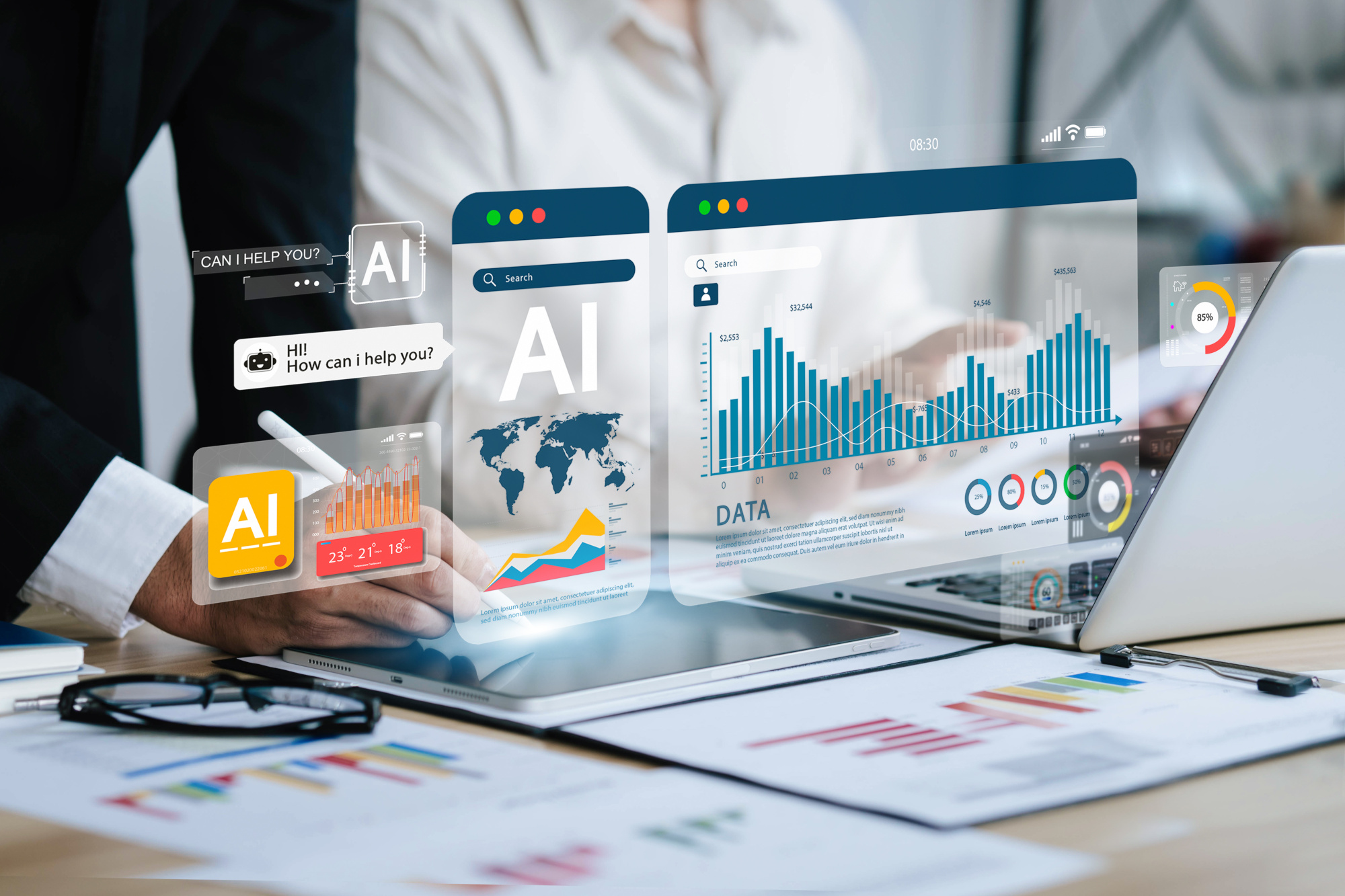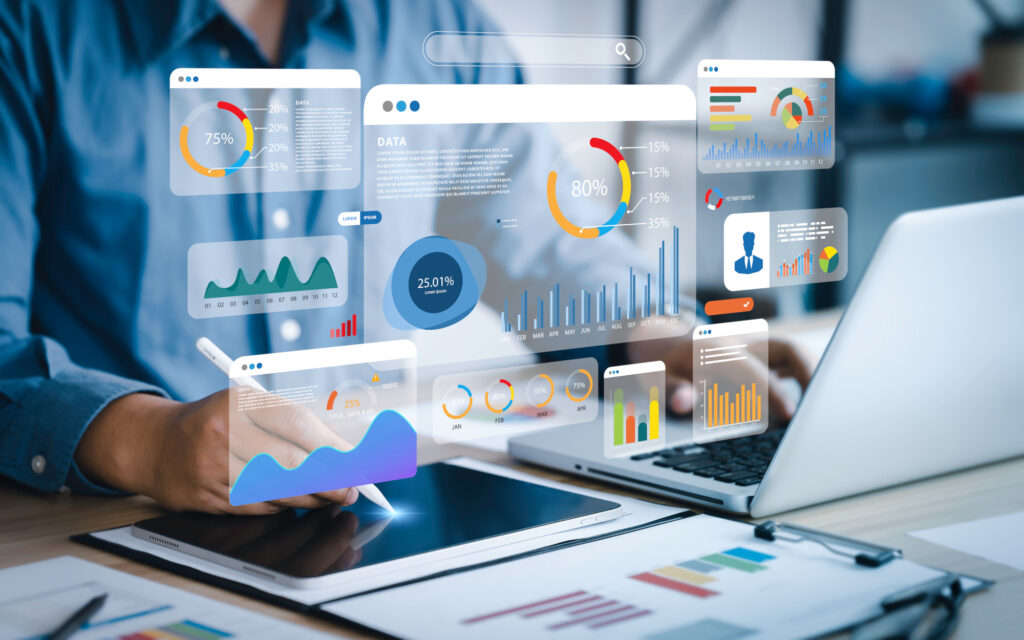It’s important to stay on top of your finances in today’s fast-paced business world if you want to thrive. But it’s no secret that managing accounts, organizing books, and making financial decisions can feel overwhelming, especially for smaller companies. That’s where HUB Analytics comes in. It’s like having a super-smart assistant that uses AI to make accounting way easier for businesses.
What Is an AI Accountant?
An AI accountant is state-of-the-art software that automates and streamlines accounting tasks by using artificial intelligence (AI) techniques. With speed and accuracy, it can do things like entering data, sorting activities into categories, matching up accounts, and making financial reports.
Additionally, it can also look at financial data and give insights, predictions, and suggestions for better money management. Companies that learn how to use AI in accounting find that it helps them save time, avoid mistakes, and make smart choices that are good for their finances.
How Can AI Be Used in Accounting?
- Automated Data Entry: AI algorithms can extract and can extract and enter data into accounting systems from a variety of sources, including invoices and receipts, doing away with the need for manual entry.
- Transaction Categorization and Reconciliation: AI can correctly sort transactions into the right categories and balance accounts on its own, which saves time and cuts down on mistakes.
- Fraud Detection: AI can analyze patterns in financial transactions to spot suspicious activities and potential fraud, which protects companies’ assets.
- Financial Analysis and Reporting: Analytics driven by AI can sift through mountains of data in search of patterns, trends, and predictions that can improve financial performance and decision-making.
- Predictive Analytics: Algorithms powered by artificial intelligence can help firms plan and budget more efficiently by predicting future financial outcomes using historical data.
- Compliance and Risk Management: One of the benefits of AI for accounting firms is real-time transaction monitoring, which helps businesses stay compliant and mitigate risks easily.

How Will AI Change Accounting?
By improving decision-making, automating tedious operations, and offering deeper insights into financial data, AI is on the brink of transforming accounting. Accountants can save time and effort by using AI-powered technologies to accomplish routine tasks like data entry, transaction categorization, and reconciliation. This allows them to focus on higher-level, strategic tasks.
Because an AI accountant can evaluate such large amounts of financial data, it can spot patterns, trends, and anomalies that humans might miss, which improves forecasting accuracy and allows for more informed decision-making. Additionally, by immediately identifying questionable activity, AI-driven fraud detection systems can assist companies in reducing financial risk.
The Benefits of Using HUB as an AI Accountant
- Efficiency: HUB automates tedious accounting tasks such as data entry, reconciliation, and report generation, saving time and reducing manual accounting errors.
- Accuracy: To improve the trustworthiness of financial data, HUB uses AI algorithms to accurately classify transactions and keep detailed financial records.
- Insightful Analytics: HUB helps companies improve their financial management by analyzing financial data and providing insights that can be used to spot trends, predict cash flow, and make educated decisions.
- Cost Savings: By automating repetitive tasks and reducing the need for manual intervention, HUB lowers operational costs associated with accounting processes.
- Scalability: HUB’s scalability allows it to expand with your company, meeting your changing accounting demands and handling more transactions with ease.
- Risk Management: Businesses can protect assets and mitigate financial risks with the help of HUB’s AI-powered fraud detection capabilities, which can detect and prevent fraudulent activity.
- Compliance: HUB provides comprehensive monitoring of transactions to identify and address any potential compliance issues, helping businesses steer clear of penalties and legal consequences.
- Strategic Support: To help organizations make good financial decisions and fuel growth, HUB offers sophisticated financial planning tools that are comparable to having a CFO.
Using HUB as Your AI Financial Advisor
Ready to revolutionize your financial analysis and decision-making? Unlock the power of AI with HUB Analytics as your trusted financial advisor. Improve your financial game today with HUB. Get faster insights, smarter tactics, and unmatched efficiency.
Frequently Asked Questions About AI Accountants
Is AI replacing accountants?
Even though AI technology is automating a lot of repetitive accounting work, accountants are still needed. Rather, it’s revolutionizing the field by enabling accountants to concentrate on higher-value tasks like customer advice, analysis, and strategic planning. By using AI tools, accountants can improve their productivity and efficacy in providing organizations with insightful data.
Is finance going to be replaced by AI?
There’s no question that AI is changing the finance industry by automating tasks, looking at large data sets, and making predictions. But it won’t be able to completely replace financial professionals. Instead, AI will help them do their jobs better, letting them focus on things like making strategic decisions, managing risks, and giving advice to clients.
Can AI do my bookkeeping?
AI for bookkeeping can manage a lot of mundane tasks, including data input, transaction classification, and the creation of financial reports. Nevertheless, accuracy, complex issue resolution, and strategic insight provision still necessitate human monitoring. Improved productivity and value-added services can be achieved when bookkeepers use AI to handle mundane duties. This frees them up to focus on more complex analysis and financial advisory for clients.
What are the disadvantages of AI in accounting?
Accounting stands to gain a lot from AI, but it’s important to weigh the pros and cons. To start, AI algorithms can make mistakes if they aren’t well-trained or if the data they are fed is inaccurate. Furthermore, AI can need human assistance when trying to understand complicated or unclear financial transactions.
How can businesses integrate AI accountants into their operations?
Businesses have the option to incorporate AI accountants into their operations by using AI-powered accounting software or platforms. It’s important to make sure that staff members are trained on how to use these tools effectively and maintain proper oversight to ensure that data is accurate and compliant.
What are the future trends in AI accounting?
In the future, AI accounting may see improvements in natural language processing so that AI systems and users can communicate better. We may also see more use of AI for predictive analytics and projections, and more integration of AI with other new technologies like blockchain.
